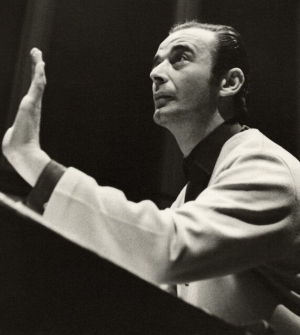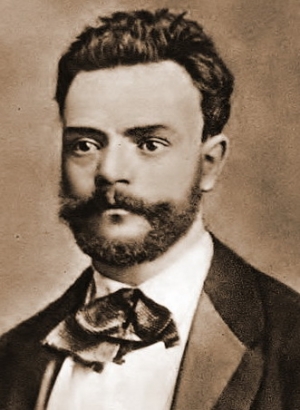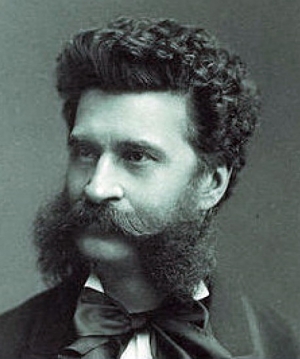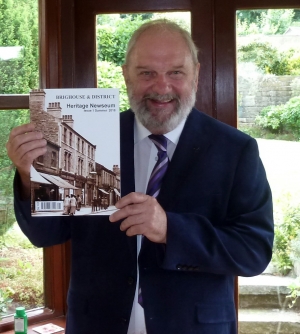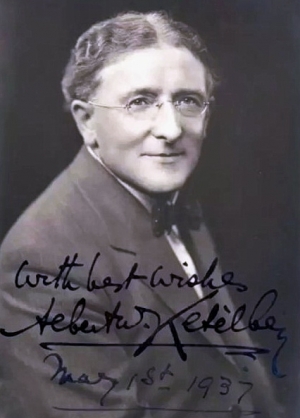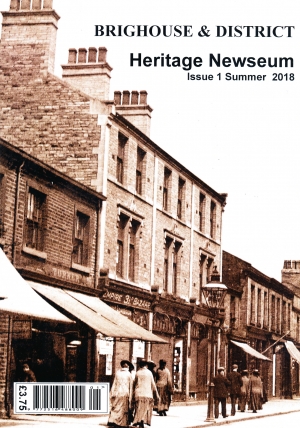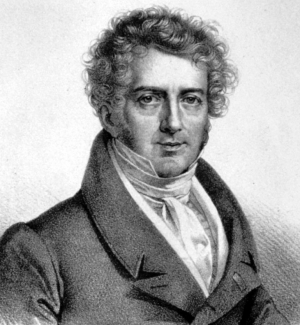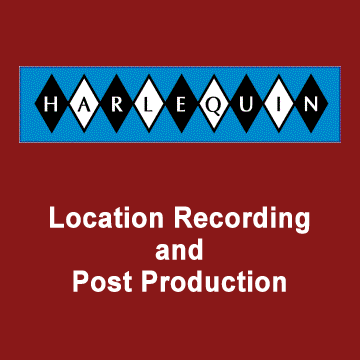Chris Helme
Maurice Handford (1929 – 1986) was a British horn player and conductor. He was principal horn of the Hallé Orchestra 1949–61, then associate conductor 1966–71, and staff conductor. He died in Warminster.
Maurice Handford died aged 58, was a conductor with a wide range in repertoire. Although he was perhaps not a familiar figure to concert goers on the South Bank, he was well known to audiences in the rest of the country and from 1971 to 1975 was principal conductor of the Calgary Symphony Orchestra.
Born in Salisbury, he studied at the Royal Academy of Music. He was a horn player and for 12 years, from 1949 to 1961, he was principal Horn in Barbirolli's Hallé. Although he did not have a big tone, he had a natural feeling for tone colour and was unfailingly accurate, one rarely heard a 'fluff' in any of his orchestral solos.
He had ambitions to be a conductor and was assisted by the patronage of ICI (Blackley), which invited him to conduct the works orchestra and, in May 1960, sponsored a Hallé concert in Manchester at which he conducted Berlioz’s Symphony Fantastique. He was also helped by Barbirolli, who invited him to conduct some Hallé industrial concerts.
By 1962 he was sufficiently launched to be given charge of the first Hallé performance of Orff’s Carmina Burana. Soon he was conducting works of the size of Strauss’s Also Sprach Zarathustra and Shostakovich's 12th symphony.
Between 1976 and 1980 be conducted Brighouse and Rastrick and CWS (Manchester) Band at major contests.
In this show he is conducting the Virtuosi Brass Band of Great Britain...
Enjoy
Expat Radio is based in France and is an online digital radio station for English speaking expats all over the world Offering up a diverse array of programming covering an eclectic taste in music, topics, interviews, competitions, news and politics; our goal is to present in styles that will provide a little bit of home, nostalgia and all round radio entertainment.
The station owners believe it's essential for a radio station to engage with listeners by hosting shows that appeal to a wide range of age groups. Whatever your personal taste in music, be it rock, dance, hip-hop, disco, Motown, country, northern soul, Classical, golden oldies or music from the world of brass bands, you can be sure to find something that will resonate with your own tastes.
Sunday Bandstand was invited to join this radio station in March 2017. The show is being heard around the world of Expats which number tens of thousands of listeners each week.
Antonín Leopold Dvořák 8.9.1841 – 1.5. 1904) was a Czech composer. After Bedřich Smetana, he was the next Czech Romantic-era composer to achieve worldwide recognition. Following Smetana's nationalist example, Dvořák frequently employed aspects, specifically rhythms, of the folk music of Moravia and his native Bohemia. Dvořák's own style has been described as "the fullest recreation of a national idiom with that of the symphonic tradition, absorbing folk influences and finding effective ways of using them".
He displayed his musical gifts at an early age, being an apt violin student from age six. The first public performances of his works were in Prague in 1872 and, with special success, in 1873, when he was aged 31. Seeking recognition beyond the Prague area, he submitted a score of his First Symphony to a prize competition in Germany, but did not win, and the unreturned manuscript was lost until rediscovered many decades later.
In 1892, Dvořák moved to the United States and became the director of the National Conservatory of Music of America in New York City. While in the United States, Dvořák wrote his two most successful orchestral works: the Symphony From the New World, which spread his reputation worldwide, and his Cello Concerto, one of the most highly regarded of all cello concerti.
In this show we are featuring Rusalka's Song to the Moon from his opera Rusalka (1900). Arranged by Gordon Langford as a cornet solo our performer is Kirsty Abbotts accompanied by the Sellers International Band with MD: Major Peter Parkes
Johann Strauss II (October 25, 1825 – June 3, 1899), son of Johann Strauss I, was an Austrian composer of light music, particularly dance music and operettas. He composed over 500 waltzes, polkas, quadrilles, and other types of dance music, as well as several operettas and a ballet. In his lifetime, he was known as "The Waltz King", and was largely then responsible for the popularity of the waltz in Vienna during the 19th century.
Strauss had two younger brothers, Josef and Eduard Strauss, who became composers of light music as well, although they were never as well known as their elder brother. Some of Johann Strauss's most famous works include "The Blue Danube", "Kaiser-Walzer" (Emperor Waltz), "Tales from the Vienna Woods", and the "Tritsch-Tratsch-Polka". Among his operettas, Die Fledermaus and Der Zigeunerbaron are the best known.
Die Fledermaus or The Bat, sometimes called The Revenge of the Bat) is an operetta which was premiered on the 5 April 1874 at the Theater an der Wien in Vienna and has been part of the regular repertoire ever since.
The overture for Die Fledermaus was arranged for brass bands by British composer and arranger Aubrey Winter (1870 - 1955) and it is featured in this show played by the Fodens Band conducted by James Scott in 1978.
The new magazine is now available at the following outlets: Harrison Lords, Bradford Road; Kitson's Newsagents, Commercial Street; Kershaw's Garden Centre, Halifax Road; Colin's Newsagent, Hipperholme and Bailiff Bridge Post Office, Cooperative Buildings.
It is also availabe through this website in the on-line store and can be bought using PayPal. You can also purchase it by contacting me on 01422-205763.
The reports in so far indicate it has been very well received. A number of customers have ordered the first year (four magazines) on subscription. The magazine is £3.75 for posting in the UK there is an additional £1.30 postage and packing charge. For overseas customers please ask with regards to the postage. To order all four magazines for the year is £20.
I have had a limited run printed for this first issue, please don't leave it too late before they sell out.
Chris
Albert William Ketelby: 9 August 1875 – 26 November 1959 was an English composer, conductor and pianist, best known for his short pieces of light orchestral music. He was born in Birmingham and moved to London in 1889 to study at Trinity College of Music. After a brilliant studentship he did not pursue the classical career predicted for him, becoming musical director of the Vaudeville Theatre before gaining fame as a composer of light music and as a conductor of his own works.
For many years Ketèlbey worked for a series of music publishers making arrangements for smaller orchestras. He also found great success writing music for silent films.
His early works in conventional classical style were well received, but it was for his light orchestral pieces that he became best known. One of his earliest works in the genre, In a Monastery Garden (1915), sold over a million copies and brought him to widespread notice; his later musical depictions of exotic scenes caught the public imagination and established his fortune. Such works as In a Persian Market (1920), In a Chinese Temple Garden (1923), and In the Mystic Land of Egypt(1931) became best-sellers in print and on records; by the late 1920s he was Britain's first millionaire composer.
His popularity began to wane during the Second World War and he increasingly found his music ignored by the BBC. In 1949 he moved to the Isle of Wight, where he spent his retirement, and he died at home in obscurity.
This week feature In a Persian Market, a popular brass piece in the early 1960s
Having written the weekly nostalgia page for the Brighouse Echo for 32 years, my time with the newspaper came to an end in January 2018. Many people told me how much they have missed my weekly stories of people, incidents, snippets of local history and nostalgia of Brighouse and its surrounding communities. It is for that reason I have decided to write and publish my new Brighouse and District Heritage Newseum magazine. I chose the word 'Newseum' to give a sense of being a museum which will be full of news in the written word and images.
The magazine is A4 with 16 inner pages and 4 outer pages. My intention is to gradually build the magazine up to 28 pages overall and publish it as a quarterly magazine.
The magazine is £3.95 + £2.25 p/p = £6.20
Our music choices this week are all by Darrol Barry, one of our most gifted and popular brass band composers and arrangers, who sadly passed away last week.
We would usually play one or two tracks from the composers catalogue on these occasions. But over the last 30 years Darrol has produced a phenomenal output of music and to choose just two would be impossible. It is likely that every brass band in the world will have sets of music written by Darrol in its library.
We have decided to dedicate the complete two hour show to a wide and diverse range from his 30 year catalogue.
I hope you enjoy the next two hours. You may just remember some of these works either as a playing member of a band or heard some of them in a concert you attended as a member of the audience.
The death has been announced of the composer Darrol Barry, who passed away on 3rd June in The Sultan Qaboos University Hospital, Muscat, Oman.
Born in Salford in 1956, Darrol Barry joined the local school brass band aged 14 on tuba — a surprise to both his parents and himself, as he wanted to play cornet.
Whilst I never actually met Darrol I am pleased to know that we exchanged and shared a few emails together. I would often play many of his compositions on my weekly Sunday Bandstand radio show. Sometimes I would be preparing a show and occasionally the title of a piece would be a little bit of a mystery. I would email him to ask for the story behind his chosen title for that particular piece. He always replied and would explain the story from the thread to the needle which would be then be part of my programme commentary about the piece.
For a little over a year we were trying to arrange when his busy schedule would allow him to have time for me to put together his musical life for one of my brass band stories. Sadly, owing to his busy schedule and various projects of my own we never actually managed to fit the time in to do it.
As a young cornet player during the 1960s and 70s one of the popular overtures in our band's repertoire was Le Calife de Bagdad by François-Adrien Boieldieu (b: 16.12.1775 - d: 8.10.1834). I am sure many listeners to this show will be able to say the same, a bread and butter good overture for park engagements.
Le Calife de Bagdad is an opéra comique in one act by this French composer. It was first performed at the Opéra-Comique, Paris on 16 September 1800 and soon became highly popular throughout Europe. It was Boieldieu's first major triumph. One member of the audience who was less impressed was the noted composer Luigi Cherubini who reproached Boieldieu, "Aren't you ashamed of such a great success, and doing so little to deserve it?" Boieldieu immediately applied to his critic for lessons in compositional techniques.
The brass band arrangement was written by William Rimmer. On this week's show it is performed by the West Yorkshire based Drighlington Band.
Enjoy the show.....


